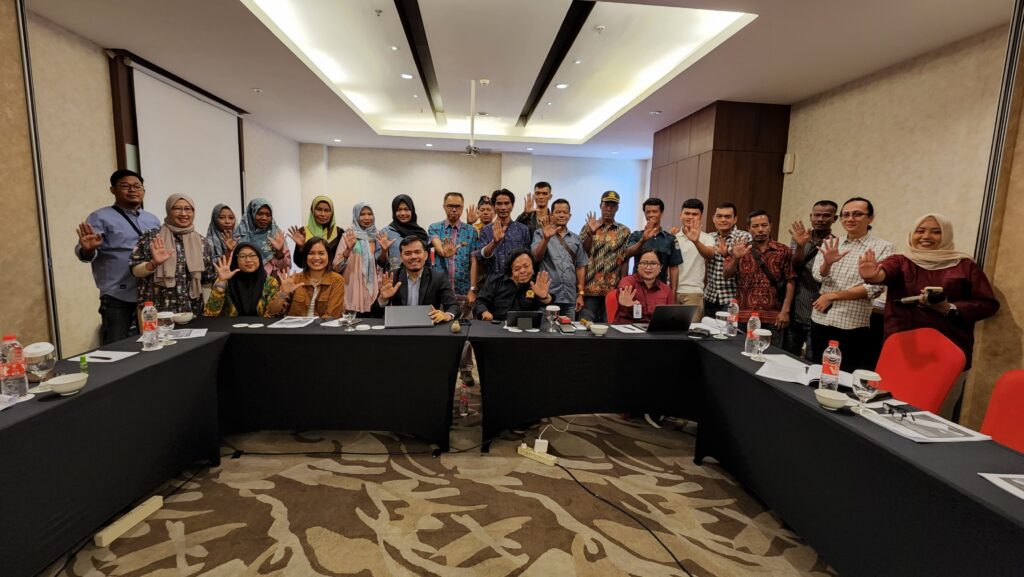Partnership, KKI WARSI, and Pundi Sumatera, together with KOMNAS HAM RI, held a dialogue forum multi-stakeholder which brings together various stakeholders to discuss the rights of indigenous peoples.
For two days, 20-21 August 2024, this forum will be an important space to listen to the voices of indigenous peoples. It is also a place to exchange ideas between communities, government, academics, and civil society organizations. This discussion provides input for the preparation of Standards and Norms for Regulation on the Rights of Indigenous Peoples which is being pursued by the Indonesian National Human Rights Commission.
The first day of discussion began with the presence of various indigenous communities from Jambi Province. Including the Anak Dalam Tribe, Talang Mamak, Batin Sembilan, and Serampas. The participation of these communities reflects the diversity of challenges they face. Although each community has its own uniqueness, they all share the same needs. Namely the recognition of their existence and protection of their rights within a clear legal framework.
In the second session on the first day, representatives of civil society organizations were also present. Enriching the discussion with a broader perspective on the social and political dynamics that affect the lives of indigenous peoples in Jambi. This collaboration shows how important a holistic approach is in addressing the issues faced by indigenous peoples.
Entering the second day, the discussion became more intensive with the presence of local government agencies and institutions, both from the provincial and district levels in Jambi. Their presence created an important opportunity to understand each other's perspectives, especially in terms of policy making and the obstacles faced in the field. This session became a bridge between indigenous communities and policy makers, ensuring that indigenous peoples' voices were heard in the decision-making process.
The final session of the discussion involved academics from various universities in Jambi Province, who brought scientific and analytical dimensions to the discussion. Their contributions are expected to strengthen the academic basis for the protection of indigenous peoples' rights, so that the arguments built have a solid foundation.
During the two days of discussions, various crucial issues were revealed, one of which was the threat to indigenous lands due to the expansion of the extractive industry. Many indigenous communities are squeezed in the middle of plantations or mining areas. A situation that not only threatens traditional areas but also their lifestyle and cultural identity.
The high level of conflict faced by indigenous peoples is also a major highlight. Participants hope that KOMNAS HAM can be more active in fighting for the rights of those who are in the midst of this conflict. Showing the urgency of the role of national human rights institutions in conflict resolution and protecting the rights of indigenous peoples.
On the other hand, several communities shared stories of their success in fighting for access to education for their children. From establishing primary schools to earning university degrees, these stories illustrate the resilience and creativity of indigenous communities in the face of challenges. Another achievement highlighted was administrative recognition. Several communities managed to obtain identity cards and other legal documents, which opened their access to various public services.
Another important idea is the need to include the protection of indigenous peoples as human rights defenders in the standards and norms being drafted. This recognition will not only give more legitimacy to their role, but also strengthen their position in the face of various forms of intimidation or criminalization.
The discussion forum in Jambi is a crucial moment where various perspectives meet to form a more comprehensive understanding of indigenous peoples' issues. The presence of KOMNAS HAM RI ensures that the standards and norms to be drafted truly reflect the reality on the ground and the needs of all parties.
Participants hope that the standards and norms produced will not be mere administrative documents, but rather a compass that will guide the policies and actions of various stakeholders in addressing complex issues related to indigenous peoples' rights.
While these standards and norms will certainly face challenges in accommodating the diversity of contexts and needs, this forum is an important step in ensuring that every nuance and complexity is accommodated. Ultimately, building bridges through these standards and norms is not just about acknowledging and protecting the legacy of the past. It is also about paving the way for a more equitable and sustainable future.
With clear guidelines and recognition of indigenous peoples as human rights defenders, there is confidence that one day, forests will remain sustainable, traditions will remain alive, and they will have a rightful place in the national development narrative.


